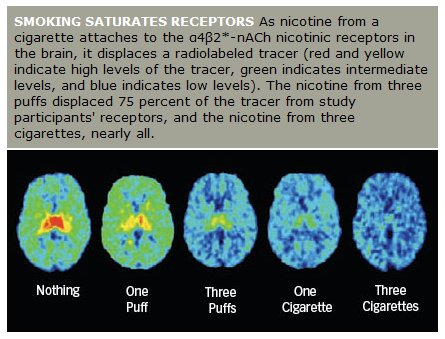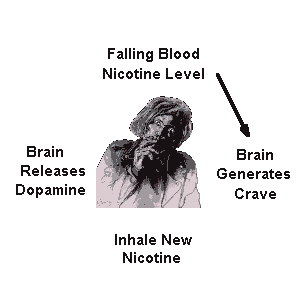Share your quitting journey
- EX Community
- Conversations
- Journals / Blogs
- The LAW OF ADDICTION
The LAW OF ADDICTION
- Subscribe to RSS Feed
- Mark as New
- Mark as Read
- Bookmark
- Subscribe
- Printer Friendly Page
- Report Inappropriate Content
Freedom from Nicotine - The Journey Home
The Law of Addiction
"Administration of a drug to an addict will cause
re-establishment of chemical dependence
upon the addictive substance."
According to the World Health Organization, “In the 20th century, the tobacco epidemic killed 100 million people worldwide. During the 21st century, it could kill one billion.”[1] Year after year, at least 70% of surveyed smokers say they want to stop,[2] and 40% make an attempt of at least one day.[3]
There is no lack of desire or effort. Sadly, what most do not know is “how.” Key to breaking free and staying free is an understanding of the "Law of Addiction." Whether users know it by name or simply understand the basic premise, failure to self-discover or to be taught this law is a horrible reason to die. The “Law of Addiction” is not man-made law. It is as fundamental as the law of gravity and refusal to abide by it is likely to result in serious injury or death.
The Law is rather simple. It states, “Administration of a drug to an addict will cause re-establishment of chemical dependence upon the addictive substance."
Mastering it requires acceptance of three fundamental principles: (1) that dependency upon using nicotine is true chemical addiction, captivating the same brain dopamine reward pathways as alcoholism, cocaine or heroin addiction; (2) that once established we cannot cure or kill an addiction but only arrest it; and (3) that once arrested, regardless of how long we have remained nicotine free, that just one hit of nicotine will create a high degree of probability of a full relapse.
Why?
We need not guess as to what happens inside a human brain that’s subjected to nicotine during recovery. The evidence seen on brain PET scans is undeniable. Just one puff of nicotine and within ten seconds up to 50% of the brain’s nicotinic-type acetylcholine receptors will become occupied by nicotine.[4]

While the smoker’s conscious mind may find itself struggling with tobacco toxin tissue burning sensations and carbon monoxide induced dizziness, well-engineered dopamine pay-attention pathways will do their job and make the experience difficult to forget. We may actually walk away from the relapse experience thinking we have gotten away with using. But it won’t be long before our brain is wanting and begging for more.
 Recovery isn’t about battling an entire pack, pouch, tin or box of our particular nicotine delivery vehicle. It’s about that first bolus of nicotine striking the brain, a hit that will end our journey, cost us liberty, and land us back behind bars.
Recovery isn’t about battling an entire pack, pouch, tin or box of our particular nicotine delivery vehicle. It’s about that first bolus of nicotine striking the brain, a hit that will end our journey, cost us liberty, and land us back behind bars.
Unfortunately, conventional “quitting” wisdom invites relapse with statements such as “Don’t let a little slip put you back to smoking.” As Joel says, it’s like telling the alcoholic, “Don’t let a sip put you back to drinking” or the heroin addict, “Don’t let shooting-up put you back to using.”
Experts are fond of stating that "on average, it takes between 3-5 serious quit attempts before breaking free of tobacco dependence,” and that “every time you make an effort you're smarter and you can use that information to increase the likelihood that your subsequent quit attempt is successful."
What these so called experts fail to reveal is the precise lesson eventually learned. Why? Why can’t it be taught and mastered prior to a user’s first attempt ever? They don’t teach it because most don’t understand it themselves. Instead they excuse failure before it even occurs, as if trying to protect the particular quitting product they are pushing from being blamed for defeat.
The lesson eventually gleaned from the school of hard-recovery-knocks is that “if I take so much as one puff, dip or chew I will relapse.” Just one, just once and defeat is all but assured.
“The idea that you can't quit the first time is absolutely wrong,” says Joel.[5] “The only reason it takes most people multiple attempts to quit is that they don't understand their addiction to nicotine. How could they, no one really teaches it. People have to learn by screwing up one attempt after another until it finally dawns on them that each time they lost it, it happened by taking a puff. If you understand this concept from the get-go, you don't have to go through chronic quitting and smoking.”
The Law Reflected in Studies
Yes, once all nicotine use ends, a single subsequent use is extremely accurate in predicting full and complete relapse. Whether it happens immediately or even when we think we’ve gotten away it, the brain’s “pay attention” circuitry records the relapse event in high definition memory. It will be etched along side survival instinct memories recording the behaviors needed to keep us alive.
The 1990 Brandon lapse/relapse study followed 129 smokers who successfully completed a two-week stop smoking program for two additional years.[6] Lapse was defined as any tobacco use regardless of how much.
Among those who lapsed, the mean number of days between the end of the “quitting” program and lapse was two months (58 days), with nearly all lapsing within the first three months. While 14% took only one or two puffs, 42% smoked the entire cigarette, while the average smoked about two-thirds. A second cigarette was smoked by 93.5% who had lapsed. Nearly half (47%) smoked that second cigarette within 24 hours, with one in five smoking it within an hour (21%). Still, a mean average of nine days passed between subjects sampling their first and second cigarette. Clearly, most of them likely thought they’d gotten away with it, that they were controlling the uncontrollable.
The Brandon study found that 60% who lapsed “asked for” the cigarette (bummed it), 23% purchased it, 9% found it, 6% stole it, and 2% were offered it. Also of note, 47% who lapsed drank alcohol prior to doing so.
Overall, the study found that 88% who “tasted” a cigarette relapsed. In discussing the finding Brandon wrote, “The high rate of return to regular smoking (88%) once a cigarette is tasted suggests that the distinction between an initial lapse and full relapse may be unnecessary.” “In our study, high initial confidence levels may have reduced subjects' motivation to acquire skills and engage productively in treatment.”
The Brandon study’s finding was echoed by the 1990 Boreland study, which followed callers to an Australian telephone quit smoking line. There, among 339 quitters who lapsed (123 who didn’t make it an entire day and 172 who quit for at least 24 hours) 295 or 87% experienced relapse within 90 days.[7]
Although the challenges of recovery have ended for hundreds of millions of now comfortable ex-users, each lives with nicotine dependency’s imprint permanently burned into their brain. Even after 10, 20 or 30 years, they remain wired for relapse.
We’re not stronger than nicotine but then we don’t need to be. It is only a chemical. Like the salt or pepper in our shakers, it has an I.Q. of zero. Like the sugar in our sugar bowl, it cannot plot, plan, think or conspire. And it is not some big or little monster that dwells inside us.
Our blood serum becomes nicotine-free and withdrawal peaks in intensity within three days of ending all nicotine use. But just one powerful jolt of nicotine and the deck gets stacked against us. The odds of us having the stamina to withstand and endure nicotine’s influence upon the brain without relapsing are horrible. While Brandon and Boreland teach us that relapse isn’t 100% guaranteed, I encourage you to treat and see one hit of nicotine as though it were.
Our greatest weapon has always been our infinitely superior intelligence. The most important recovery lesson our intelligence can master is that being 99% successful at not using nicotine equates to an 87% to 88% chance of defeat.
As Joel Spitzer has now burned into my brain, there’s just one controlling principle determining the outcome for all. Unlike quitting products, total adherence to a personal commitment to not violate the law of addiction provides a 100% guarantee of success. Although obedience may not always be easy, the law is clear, concise and simple - no nicotine today, not one puff, dip or chew!
You must be a registered user to add a comment. If you've already registered, sign in. Otherwise, register and sign in.
The Law of Addiction
The Law of Addiction: Quitting's Only Rule*
The Law Of Addiction
Forget or ignore the Law of Addiction at your own Peril
-
Helping Adult Quit
13 -
Helping Child Quit
11 -
Longtime Quit
880 -
Preparing to Quit
275 -
Quitting Chewing
17 -
Quitting Medicinal Nicotine
15 -
Quitting Smoking
363 -
Quitting Tobaccoless Pouches
10 -
Quitting Vaping
174 -
Recently Quit
431 -
Staying Quit
173 -
Trying Again
172 -
Undecided
19
